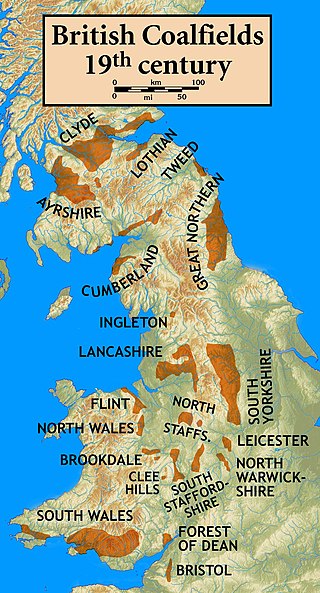
The United Mine Workers of America is a North American labor union best known for representing coal miners. Today, the Union also represents health care workers, truck drivers, manufacturing workers and public employees in the United States and Canada. Although its main focus has always been on workers and their rights, the UMW of today also advocates for better roads, schools, and universal health care. By 2014, coal mining had largely shifted to open pit mines in Wyoming, and there were only 60,000 active coal miners. The UMW was left with 35,000 members, of whom 20,000 were coal miners, chiefly in underground mines in Kentucky and West Virginia. However it was responsible for pensions and medical benefits for 40,000 retired miners, and for 50,000 spouses and dependents.

Alexander Mitchell Palmer was an American attorney and politician who served as the 50th United States attorney general from 1919 to 1921. He is best known for overseeing the Palmer Raids during the Red Scare of 1919–20.

The State Electricity Commission of Victoria is a government-owned renewable electricity investment enterprise in Victoria, Australia. Originally a major energy supplier in the state, the SEC was privatised in the 1990s before being revived in 2023 to invest in renewable energy and storage.
The following is a timeline of labor history, organizing & conflicts, from the early 1600s to present.

The Electricity Act 1947 was an Act of the Parliament of the United Kingdom which nationalised, or bought into state control, the electricity supply industry in Great Britain. It established a central authority called the British Electricity Authority (BEA) to own and operate all public electricity generation and transmission facilities and created 14 area electricity boards with a duty to acquire bulk supplies of electricity from the central authority and to distribute and sell electricity economically and efficiently to industrial, commercial and domestic consumers. It vested 505 separate local authority and company owned electricity undertakings in the BEA with effect from 1 April 1948. The Electricity Act 1947 is one of a number of Acts promulgated by the post-war Labour government to nationalise elements of the UK’s industrial infrastructure; other Acts include the Coal Industry Nationalisation Act 1946; Transport Act 1947 ; Gas Act 1948; and Iron and Steel Act 1949.

Coal India Limited (CIL) is an Indian central public sector undertaking under the ownership of the Ministry of Coal, Government of India. It is headquartered at Kolkata. It is the largest government-owned-coal-producer in the world. It is also the ninth largest employer in India with nearly 272,000 employees.

The Copyright, Designs and Patents Act 1988, also known as the CDPA, is an Act of the Parliament of the United Kingdom that received royal assent on 15 November 1988. It reformulates almost completely the statutory basis of copyright law in the United Kingdom, which had, until then, been governed by the Copyright Act 1956 (c. 74). It also creates an unregistered design right, and contains a number of modifications to the law of the United Kingdom on Registered Designs and patents.

Coal in India has been mined since 1774, and India is the second largest producer and consumer of coal after China, mining 777.31 million metric tons in FY 2022. Around 30% of coal is imported. Due to demand, supply mismatch and poor quality with high ash content, India imports coking coal to meet the shortage of domestic supply. Dhanbad, the largest coal producing city, has been called the coal capital of India. State-owned Coal India had a monopoly on coal mining between its nationalisation in 1973 and 2018.

The Singareni Collieries Company Limited or SCCL is a government-owned-coal mining corporation in India. It is under the ownership of Department of Energy, Government of Telangana. The Union Government's administration of the company is through the 49% ownership held by Ministry of Coal. SCCL is currently operating 45 mines where 20 opencast and 25 underground mines in 6 districts of Telangana with a manpower around 45,079 as of Nov. 2020. SCCL is contributing 9.2% in the all India Domestic Production. Since inception (1889) 1.36 BT of Coal is extracted by SCCL and it has proved reserves of 10.84 BT.
The Lackawanna Steel Company was an American steel manufacturing company that existed as an independent company from 1840 to 1922, and as a subsidiary of the Bethlehem Steel company from 1922 to 1983. Founded by the Scranton family, it was once the second-largest steel company in the world. Scranton, Pennsylvania, developed around the company's original location. When the company moved to a suburb of Buffalo, New York, in 1902, it stimulated the founding of the city of Lackawanna.

The Coal Industry Nationalisation Act of 1946 was an Act of the Parliament of the United Kingdom which nationalised, or brought into state control, the coal industry in the United Kingdom. It established the National Coal Board as the managing authority for coal mining and coal processing activities. It also initially provided for the establishment of consumers' councils. The Coal Industry Nationalisation Act 1946 was the first of a number of Acts promulgated by the post-war Labour government to nationalise elements of the UK's industrial infrastructure; other Acts include the Electricity Act 1947; the Transport Act 1947 ; the Gas Act 1948; and the Iron and Steel Act 1949.

The Accessories and Abettors Act 1861 is a mainly repealed Act of the Parliament of the United Kingdom of Great Britain and Ireland. It consolidated statutory English criminal law related to accomplices, including many classes of encouragers (inciters). Mainly its offences were, according to the draftsman of the Act, replacement enactments with little or no variation in phraseology. It is one of a group of Acts sometimes referred to as the Criminal Law Consolidation Acts 1861. It was passed with the object of simplifying the law. It collected the relevant parts of Peel's Acts and others.
Canal Mania was the period of intense canal building in England and Wales between the 1790s and 1810s, and the speculative frenzy that ensued in the early 1790s.

The Be 4/6 12302 was one of four test locomotives ordered by the Schweizerische Bundesbahnen (SBB) in June 1917, along with the Be 3/5 12201, Be 4/6 12301 and Ce 6/8I14201. It was intended to be used on the Gotthardbahn, in order to gain experience in ordering and operating electric locomotives, However, the Be 4/6 12302 was never used for scheduled services on the Gotthard, because at its introduction it was already outperformed by the successor class Be 4/6 12303-12342.

Coal mining in the United Kingdom dates back to Roman times and occurred in many different parts of the country. Britain's coalfields are associated with Northumberland and Durham, North and South Wales, Yorkshire, the Scottish Central Belt, Lancashire, Cumbria, the East and West Midlands and Kent. After 1972, coal mining quickly collapsed and had practically disappeared by the 21st century. The consumption of coal—mostly for electricity—fell from 157 million tonnes in 1970 to 18 million tonnes in 2016, of which 77% was imported from Colombia, Russia, and the United States. Employment in coal mines fell from a peak of 1,191,000 in 1920 to 695,000 in 1956, 247,000 in 1976, 44,000 in 1993, and to 2,000 in 2015.
The 1927 Indiana bituminous strike was a strike by members of the United Mine Workers of America (UMWA) against local bituminous coal companies. Although the struggle raged throughout most of the nation's coal fields, its most serious impact was in western Pennsylvania, including Indiana County. The strike began on April 1, 1927, when almost 200,000 coal miners struck the coal mining companies operating in the Central Competitive Field, after the two sides could not reach an agreement on pay rates. The UMWA was attempting to retain pay raises gained in the contracts it had negotiated in 1922 and 1924, while management, stating that it was under economic pressure from competition with the West Virginia coal mines, was seeking wage reductions. The strike proved to be a disaster for the union, as by 1929, there were only 84,000 paying members of the union, down from 400,000 which belonged to the union in 1920.

The United Mine Workers coal strike of 1919 saw bituminous coal miners strike for over a month, from November 1 to December 10, 1919, for better wages.
The Electric Lighting Acts 1882 to 1909 are Acts of the Parliament of the United Kingdom. They comprise four public general Acts: the Electric Lighting Act 1882 ; the Electric Lighting Act 1888 ; the Electric Lighting (Clauses) Act 1899 ; and the Electric Lighting Act 1909. The 1882 Act was the first public measure to facilitate and regulate the early electricity industry in the UK. It enabled the Board of Trade to authorise the supply of electricity in any area by a local authority, company or person. Its provisions allowed suppliers to avoid the effort and expense of promoting Private Parliamentary Bills to regularise their legal powers to supply electricity. The 1888 Act amended the 1882 Act and extended the local authority reversion period from 21 to 42 years. The Electric Lighting (Clauses) Act 1899 incorporated in one Act the clauses and provisions contained in provisional orders made under the 1882 and 1888 Acts. It laid down common principles to be incorporated in all provisional orders. The Electric Lighting Act 1909 amended the earlier legislation to reflect the need to reorganise electricity supply to take into account technical developments in the generation and transmission of electricity. The Electric Lighting Acts were amended by subsequent legislation, such as the Electricity Act 1947 which nationalised the electricity supply industry. The Electric Lighting Acts 1882 to 1909 were repealed in their entirety by the Electricity Act 1989, which privatised the UK electricity supply industry.

The Electricity (Supply) Act 1926 was an Act of the Parliament of the United Kingdom which amended the law on the supply of electricity. Its long title is: ‘An Act to amend the law with respect to the supply of electricity’. This Act was construed as one with the Electricity (Supply) Acts 1882 to 1922, and was cited as the Electricity (Supply) Acts 1882 to 1926. It established a statutory body, the Central Electricity Board (CEB), ‘with the duty of supplying electricity to authorised undertakers’ and to ‘appoint consultative technical committees’. It provided for the Electricity Commissioners to prepare and transmit to the CEB ‘electricity schemes’ for relevant areas, and which identified the most efficient ‘selected’ generating stations which were to be used to generate electricity for the Board. The Act provided for ‘main transmission line’ interconnections between selected stations and undertakings; and to standardise the frequency of generation; and other purposes. The provisions of the Act enabled the construction of the National Grid.

The 2021–2023 Warrior Met Coal strike was a failed labor strike in Alabama, United States. The strike began on April 1, 2021 and involved members of the United Mine Workers of America striking against Warrior Met Coal Inc. Warrior Met was formed after the bankruptcy of Walter Energy and operates coal mining facilities in the state. The strike was over the failure of the union and company to agree to a labor contract for the approximately 1,100 union members who work for Warrior Met. UMWA International President, Cecil Roberts ultimately failed to achieve the strike's goals, leading to losing over 50 percent of the Union membership at Warrior Met.












